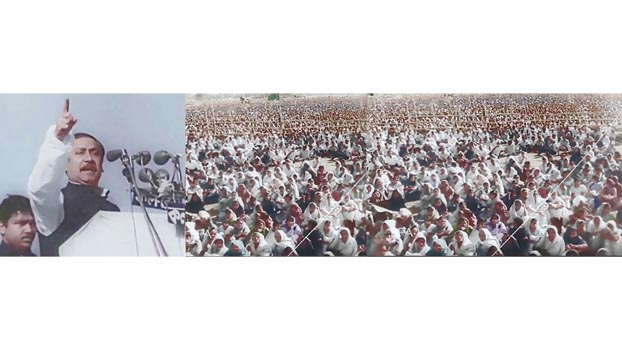Book Review and Analysis
“Bangabandhur Sat-e March Er Bhashon: Rajneetir Mahakabyo”

Being a former student of Media and Communication, in one of my academic courses I was supposed to learn and study the rhetoric analysis of the historic 7thMarch speech. While doing this, I was exploring why whenever or wherever I watch it or listen to it, it gives me a feeling of being the son of the Father of the Nation Bangabandhu Sheikh Mujibur Rahman. Also while doing this, I found this speech to be one of the masterpieces of persuasive public speaking in the world’s history.
However, to understand the significance, depth and rhetorical appeals of the historic 7th March speech, recently I have found a book titled “Bangabandhur Sat-e March Er Bhashon: Rajneetir Mahakabyo” (Bangabandhu's 7th March Speech: An Epic Poem of Politics) worth reading. It was published along with its e-book format and mobile application in November, 2017 following a few days of UNESCO’s recognition of the 7th March speech.
The ICT Division took the great initiative for publishing this book in a bid to properly present the historic 7th March Speech of Bangabandhu in various digital platforms. State Minister for ICT, Junaid Ahmed Palak was the main planner and chief adviser of the project. Former ICT secretary Shyam Sundar Sikder and senior journalist Ajit Kumar Sarkar edited the book while renowned artist Hashem Khan designed its cover.
The book “Bangabandhur Sat-e March Er Bhashon: Rajneetir Mahakabyo” (Bangabandhu's 7th March Speech: An Epic Poem of Politics) is an example of an epic and unequivocal persuasion by the Father of the Nation Bangabandhu Sheikh Mujibur Rahman. The book reveals analytical articles on Bangabandhu's historic 7 March Speech. It is a compiling analysis of the renowned intellectuals, political commentators, analysts and academic personalities based on the selected 26 sentences on the Father of the Nation's historic speech.
The top intellectuals of the country who contributed to the publication of this book with their analytical write-ups include Mustafa Nur-Ul Islam, Abdul Gaffar Chowdhury, Prof Emeritus Anisuzzaman, Prof Muntasir Mamun, Prof AAMS Arefin Siddique, Dr SA Malek, Selina Hossain, Hasan Azizul Haque and some other intellectuals, educationists and writers.
The bookincludes the full text of the Sheikh Mujib’s 7th March speech and all the above top intellectuals have interpreted it.
In fact, the book starts with transcribing the entire text of the historic 7th March speech both in Bengali and English. At the erstwhile Race Course Maidan (currently Suhrawardy Udyan), the history begun like this:
“My brothers,
I have come before you today with a heart laden with sadness. You are aware of everything and know all. We have tried with our lives. And yet the sadness remains that today, in Dhaka, Chittagong, Khulna, Rajshahi and Rangpur the streets are soaked in the blood of my brothers. Today the people of Bengal desire emancipation, the people of Bengal wish to live, the people of Bengal demand that their rights be acknowledged”
Standing in front of a sea of people Bangabandhu thundered:
“In every village, every neighborhood, set up Sangram Parishad under the leadership of the Awami League. And be prepared with whatever you have. Remember: Having mastered the lesson of sacrifice, we shall give more blood. God willing, we shall free the people of this land”.
At the end of his speech, Bangabandhu Sheikh Mujibur Rahman declared, ‘Ebarer Sangram Amader Muktir Sangram, Ebarer Sangram Swadhinatar Sangram’ (The struggle this time is the struggle for our emancipation; the struggle this time is the struggle for independence).
To analyze and interpret the speech, the book “Bangabandhur Sat-e March Er Bhashon: Rajneetir Mahakabyo” (Bangabandhu's 7th March Speech: An Epic Poem of Politics) arranges and divided the entire text into numerous quotes or sentences in accordance with Bengali alphabets. It selects 26 sentences from the entire text of the historic 7th March Speech to analyze.
For example, in this book, the analysis of the 7th march speech starts with interpreting the sentence “Aj Banglar manush mukti chay/ Banglar manush bachte chay, Banglar manush tar odhikar chay” (Today the people of Bengal desire emancipation, the people of Bengal wish to live, the people of Bengal demand that their rights be acknowledged) by Mustafa Nur-Ul Islam.
Dr SA Malek analyzes ‘Ebarer Sangram Amader Muktir Sangram, Ebarer Sangram Swadhinatar Sangram’ (The struggle this time is the struggle for our emancipation; the struggle this time is the struggle for independence).
“Rokter dag ekhono shukay nai” (The marks of the blood have not dried yet) is analyzed by the famous writer Hasan Azizul Haque. The analysis session of the book ends up with interpreting the concluding remark, “Joy Bangla” by Abdul Gaffar Chowdhury. However, similarly this book divides the text of the historic 7th march speech into various sentences or quotes and analyses those.
The historic 7th March speech was so powerful that it had bolstered the Bengalis to start their nine-month long bloody journey for freedom. It created such a strong sense of mass-agitation amongst deceived people of Bangladesh which had compelled them to break the chain of oppression. Moreover, yet this speech has been an epitome of valor and courage even after forty six years of our liberation. Also it has been transcending to every aspect of our lives since the independence of the country.
The presentation of the 7th March speech produced such rhetorical appeals which persuaded people of all ages and all classes and also people from every walks of life. The birth of Bangladesh is the burning example of the fruitfulness of the historic 7th March speech. Sheikh Mujib’s idiosyncratic appeal with his arduous voice and examples from the history built his credibility and gained the trust of the mass-people. Despite all the conflicts between erstwhile East and West Pakistan, Bangabandhu addressed the West Pakistanis as “brothers.” Those who sacrificed their lives became his “children.” Through such words he touched the core of heart of the people.
In the preface of this book, Honorable Prime Minister Sheikh Hasina wrote, "The heartfelt demand of the mass people of Bangladesh was resounded by this epoch-making speech of Father of the Nation. The killings, oppression, and torture of the Pakistani occupation forces on the Bengalees were pictured through this Speech, and the main goal of this Speech was the necessity and desire of the emergence of an independent State."
She added “Father of the Nation Bangabandhu asked the Bengalis to remain prepared with whatever they had as he delivered it at the final stage of the independence struggle that united the entire nation against the colonial Pakistani forces and the Bengali Nation, and then started taking preparations for taking part in the armed War of Liberation being imbued with his inspirational speech”.
“Bangabandhur Sat-e March Er Bhashon: Rajneetir Mahakabyo” (Bangabandhu's 7th March Speech: An Epic Poem of Politics) divulges such an in-depth analysis of the 7th March speech which certainly plunge the readers into the psyche of the Bangabandhu Sheikh Mujibur Rahman. Such interpretation of the important sentences derived from the 7th March speech will help the next generation to understand and perceive the dream and ideal of Bangabandhu for building Bangladesh. This book would have remain an aide-mémoire that Bangabandhu and the reminiscence of our martyrs can never be forgotten and also the rape and slaughters committed by the Pakistan can never be elapsed.
We believe that certainly the recent recognition of the historic 7th March speech by UNESCO and also the recent publication of this book by the ICT Division will keep supporting to turn the value of this historic speech into a world chattel. Also we feel the necessity for including such textual analysis of the historic 7TH March speech in the academic books which will help the students and next generation to understand the contribution of Bangabandhu towards giving the birth of a new sun of freedom.
We would like to express our heartiest gratitude to the honorable State Minister for ICT Junaid Ahmed Palak and also to everyone who are being involved with the publication of this book. We hope through this book, the great political poet, Father of the Nation Bangabandhu Sheikh Mujibur Rahman along with his 7th March rhapsody would have remain alive forever not only in the heart of the every Bengalees but also in veins of humankind.



